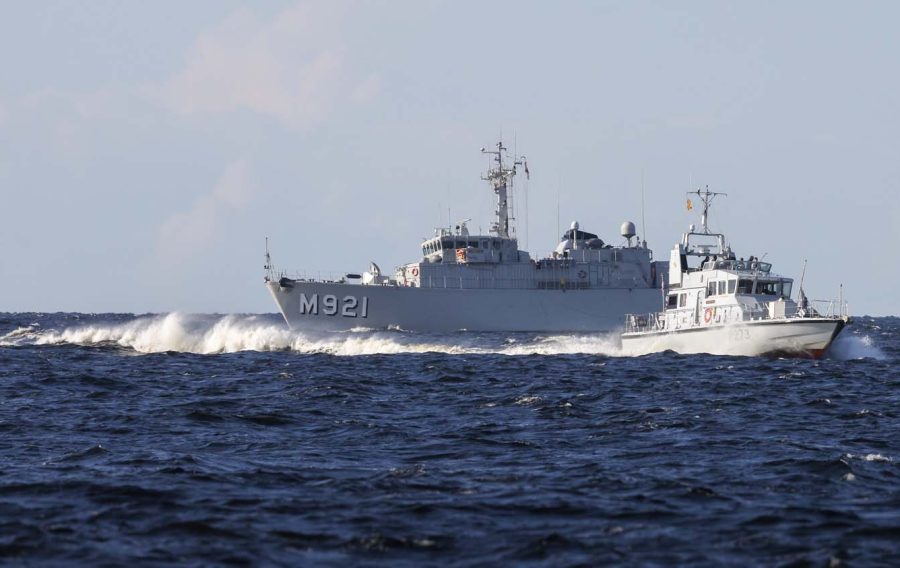
The Royal Navy has successfully used its smallest warships as a launchpad for autonomous mine hunting operations for the first time.
Seven P2000 patrol vessels of the Coastal Forces Squadron deployed on NATO’s annual Baltic exercise – known as Baltops 24 – during which 50 ships, dozens of aircraft and 9,000 personnel from 20 nations operated closely together for the security and safety of the region.
Two ships, HMS Puncher and Pursuer, welcomed aboard experts from Zulu Squadron of the Mine and Threat Exploitation Group and their autonomous craft.
Zulu Squadron are usually responsible for keeping the waterways clear and safe on the Clyde in Scotland through which the UK’s Vanguard strategic deterrent submarines operate from their base at Faslane.
But they deployed a team of five to Baltops as a trial to see if they could send expeditionary mine hunting kit on overseas operations – with a view to them being able to do this anywhere in the world on demand in the future.
The team brought with them an IVER 3 Autonomous Vehicle, which operates independently, scanning the seabed with its sonar to identify potential mines and a Video Ray Defender remotely operated vehicle which sends a live stream back to the operator to safely find potential mines on the sea bed.
While operating in the Gulf of Riga, in the approaches to Latvia’s capital, Zulu Squadron surveyed 620,000sq m of an historic minefield – that’s an area more than 40 times the size of the Wembley pitch – in just two days.
Many of the Baltic’s waterways were mined heavily in both World Wars, while ammunition and ordnance was also disposed of after the conflicts had ended.
Only last year it was reported that 80,000 mines and other unexploded remnants lurk on the seabed, making it a key focus of allied navies to make the Baltic Sea safer.
“I’m especially pleased with how the team have remained adaptable to challenges posed by the equipment and the weather, working long days and even encountering a bear while we were driving through the Latvian countryside,” said Lieutenant Malcolm Andrews, Zulu’s Operations Officer.
“I hope that the success we have had on Baltops 24 has proved the utility of the innovative equipment and sees the navy expand its expeditionary mine hunting capability into the future.
“Although we’ve not identified any mines, we have been able to designate large areas of seabed clear of any historic ordnance.”
Elsewhere, patrol boats HMS Archer, Ranger and Example were involved in exercises in the complex island chain of the Stockholm Archipelago – where Royal Marines have also been operating.
Some 30,000 islands, rocks and skerries fan out 50 miles from Sweden’s capital into the Baltic and is the perfect place for the squadron to test and develop their coastal warfare tactics.
The P2000s were used as ‘enemy’, charged with harassing larger warships of the Swedish and Dutch navies in the confined waters.
Lieutenant Jack Patterson, Commanding Officer of HMS Archer said: “We are very happy with what we have achieved on Baltops this year, and it has sparked plenty of ideas for future iterations and how we continue to develop the utility and operational output of the P2000 as a platform. Our units continue to prove their versatility in a range of environments.”
Commander Richard Skelton Royal Navy, Commander Coastal Forces Squadron, added: “ It is a great pleasure to be invited to take part in Baltops as it provides an excellent opportunity to share ideas and develop new ways of working with NATO allies. This year has had the added bonus of successfully deploying a minehunting capability from the platform and being able to clear a significant area of historic ordnance.”
The squadron also worked with US forces specialising in Survival, Evasion, Resistance and Escape (SERE) techniques.
The ships delivered SERE teams on to land, working with US aircraft and Lithuanian patrol vessels, to find and rescue downed aircrew.
P2000s can operate alone and often do, but were split into two task groups after deploying in May for Baltops: HMS Explorer, Express, Puncher and Pursuer all focused on the area near Latvia, while Archer, Ranger and Example were near to Sweden.
Operating in groups allows crews to support each other in logistics and planning.
Their craft – 68ft long, displacing a mere 54 tonnes and with a crew of just five – perform an increasingly wide-ranging role delivering operational tasks in UK waters and beyond.
Able Rating 2 Michael Betteridge was embarked on HMS Pursuer for wider professional development.
He said: “Being onboard HMS Pursuer for Baltops has offered me a unique opportunity to develop my maritime and seamanship skills. It also allowed me to experience operating with NATO partners and enjoy some great port visits.”
The Coastal Forces Squadron is now at the world’s most famous sailing regatta, Kieler Woche, in Kiel.
Image: HMS Pursuer acting as enemy forces during BALTOPS 2024 against Belgian Minehunter Lobelia
If you would like to join our community and read more articles like this then please click here








